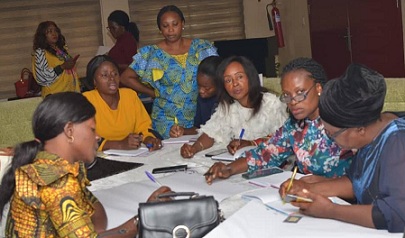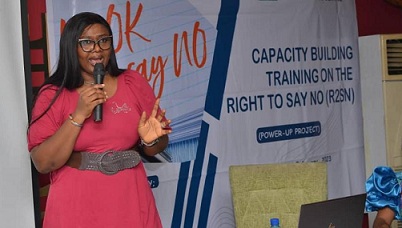By Paul Williams
The right of individuals within a community, and the community itself, to say ‘No’ to activities and policies they deem “harmful and unfavourable” was the focus of a 3-day training for women from various communities in the Niger Delta.
The training, organized by Kebetkache Women Development and Resources Centre, with support from WOMIN African Alliance, saw the attendance of women groups from Ibeno in Akwa Ibom State, Eleme, Okwuzi and Abua/Odual in Rivers State.
As captured in its title, ‘The Right to Say No,’ the training explored the nuances of decision-making within communities, seeking to know: Who and who make up a community; Who can say ‘No’ and who cannot say ‘No’ within the community; When a community can say ‘No,’ and when not to say ‘No,’ as well as the mechanisms for saying ‘No.’
The need to say No, as the women identified, finds currency in the light of “harmful” exploitative activities by multinational companies, unfavourable government policies, insecurity, discrimination against women, unemployment, gender violence, lack of social infrastructure among others.
Executive director of Kebetkache Women Development and Resources Centre, Emem Okon, in a welcome address read by Idongesit Alex, noted that the first training on the Right to Say No was “more of a national training,” incorporating participants from outside the project sites.
“This second training is particularly meant for participants from four projects sites,” she said, adding that “The project expects to see grassroots women in four sites in the Niger Delta formulate and voice their interests in relation to large scale projects related to oil and gas extraction, and advocating a clear vision for the development alternative.”

Emem Okon explained that the R2SN project, which is a component of the Power Up project, is being implemented in partnership with WOMIN African Alliance in South Africa and Centre for Natural Resources Governance in Zimbabwe, in Okwuzi, Abua, Ogoni and Ibeno communities.
In a chat with newsmen, Kebetkache’s executive director, Okon, explained that “Women being marginalized for years, there is a tendency for them to say ‘Yes’ to any time somebody or group of persons bring something and say they are bringing ‘development’.
“The idea of Say No is that when people come with ‘big project’ that appears to be ‘everything’ – saying ‘it will bring wealth, it will bring development’; can women and community members question this ‘development” and try to understand how it will impact on their lives or bring the kind of changes that they want to see?
“Can women say No to bogus ‘development’ (or policies) that does not translate to any positive changes in their lives and in their communities,” she asked.
Barr Victoria Ibezim-Ohaeri, executive director of Spaces for Change, in a paper on ‘Enforcing the Right to Say No,’ explored how communities can say No to projects and social issues that are unfavourable to them, as well as mechanisms and legal opportunities available for them to do so.
She explained that whether in agreement between individuals or contracts between community and companies, consent given by parties must be “free, prior and informed (FPI),” adding that consent obtained without meeting these criteria can be withdrawn.
The need for consent to be free, prior and informed, she further explained, naturally provides opportunity and mechanism for communities and persons to say No to unfavourable policies and situations.
Barr Ibezim-Ohaeri later told newsmen that women are the backbone of the rural economy and family, and are more impacted by issues confronting the community.
“Women are disproportionately impacted, which means they bear a heavier burden than any other group in the community. So, it means that women should be empowered to resist those things that are causing them harm – such as reducing maternal mortality.
“This training is to create that empowerment, because they are naturally excluded from the spaces and mechanisms where these decisions are made. They need to get into those spaces, have access to the table and be part of the decision-making process,” she said.
The recourse to Alternative Dispute Resolution (ADR) in seeking redress to issues affecting them offers a cost-effective, time-efficient and less emotion-draining remedy for women.
Barr Rosemary Inko-Dokubo, head, Rose & Associates, in her lecture on ADR, urged the participants at the training to seek negotiation, mediation and arbitration as avenues of dispute resolution, rather than rushing “to court to sue for claims, and everyday they say adjournment, take another date.
“Women are more economical. This is why we say that rather taking someone to court, two of you can go to Multi-door court, negotiate and see how you can resolve your matter within two weeks, and still come out (of dispute) as friends rather than enemies.”
Inko-Dokubo explored legislations and provisions impacting directly on women, with particular attention to the women inheritance law recently signed into existence in Rivers State, while pointing out the opportunities for alternative dispute resolution in the state as expressed through the creation of the Family Court, Multi-Door Court and Small Claims Court.
One of the participants, Esther Okon-Itrechio, from Ibeno (“where Mobil is located”), said “we have to stand up on things that are not right by saying No. No to our corrupt leaders, No to government and our representatives for not putting things right.
“That is why we are here, in order to be impacted with the knowledge of how to say No to those things and issues that are bringing about more problems in our community,” she said.
 PH Mundial – Port Harcourt Online Newspaper News Across The Region
PH Mundial – Port Harcourt Online Newspaper News Across The Region



